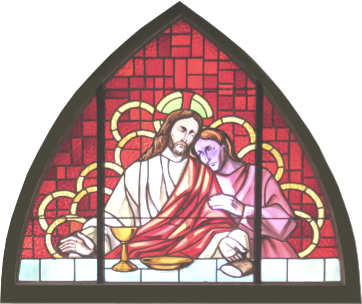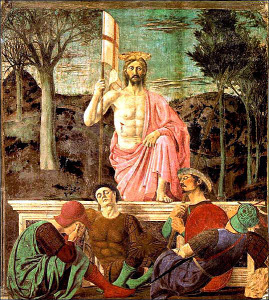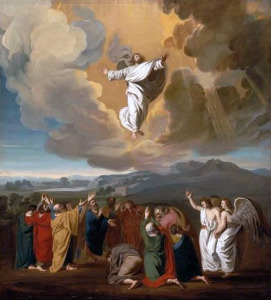The New Age Movement
A Non-Christian Trend
March 17, 2018
By Lorraine Vincent
Download a printable pdf version
In our Western society, people are becoming interested in some aspects of Eastern religion. Christians are adopting methods of prayer, practices and techniques that are not Christian, that come from ancient Hindu and Buddhist religions which date back 5,000 years. It is called the New Age Movement. It started to become popular in the 1960’s.
New Age Document
To guide us in the Truth, St. John Paul II published a document on New Age on February 3, 2003. It is called Jesus Christ the Bearer of the Water of Life, A Christian reflection on the “New Age”. This comprehensive work quotes classic New Age writings, discusses common points in the New Age Movement, and presents a comparison between New Age spirituality and Christian spirituality. In the following pages I quoted some sentences from this document and highlighted some words to emphasize certain points.
This document states in Section 2.5, “New Age has become immensely popular as a loose set of beliefs, therapies and practices, which are often selected and combined at will … What is offered is often described as simply ‘spiritual’, rather than belonging to any religion, but there are much closer links to particular Eastern religions than many ‘consumers’ realize.” I was one of these ‘consumers’.
My Testimony
In the 1960’s I did not realize that my belief in my Catholic faith had gown weak. I was very naïve. I played the Ouija Board game once which was a scary experience. I found out later that I was communicating with a demon spirit in this dangerous occult game; and all the answers to my questions that I received, turned out to be lies. We have to be careful not to consult the Evil One. Unfortunately, one thing tends to lead to another. Not good. The devil makes evil appear interesting and good. So I continued to experiment in different practices, not knowing that they were New Age. I became interested in New Age exercises and meditations. I was enticed into Transcendental Meditation (similar to Centering Prayer). I was given a mantra, a few words in a language foreign to me. It involved repeating this mantra daily for 20 minutes. I didn’t know that it was a mind emptying technique that opened me to an evil spirit. After several months of this, I began to feel uneasy and stopped that kind of meditation.
Meanwhile I had an accident and tore my back muscles. In terrible pain and unable to bend my back, I continued to delve deeper into the New Age. Seeking a healing, I tried some holistic health practices: acupuncture, homeopathy and iridology for years. I spent about $300 a month on all this with no relief from pain and no healing. Finally years later, I went back to my original family medical physician, prayed to our one True God, received conventional medical science injections (not New Age) in my torn muscles and within a couple of days the pain was completely gone! My muscles are no longer torn.
After the Vatican’s New Age document was published in 2003, I studied it thoroughly and did a lot of research. As the years went by, I also studied our Catechism of the Catholic Church, (CCC), and read many Catholic Church documents, growing in our Catholic faith. I found out that my mantra in Transcendental Meditation was the name of a god worshipped in India. I was shocked! I did not want to pray to a foreign god or evil spirit. Then I began to write articles on the dangers of this New Age Movement, to try to help people who are searching for the Truth, not to fall into these evil practices.
Fallen Angels
It’s important to understand the Truth about the gods and spirits that we hear about in our New Age society. First of all, there are only good spirits or bad spirits. The good spirits are angels and the bad spirits (called gods) are demons. These gods/bad spirits are really the fallen angels who were cast out of Heaven by God along with their leader, Lucifer. In the beginning, when all the angels were in Heaven and worshipped God, their Creator, they were beautiful, and Lucifer was the most beautiful of all. But when Lucifer and 1/3 of all the angels rebelled against God and refused to obey and worship Him, they were cast down to earth and into Hell. God took away their angelic beauty and they became ugly evil spirits whom we call demons. Lucifer their leader became the ugliest and is now called Satan, the devil, the Evil One. They hate God; and because God created mankind and loves us, they hate us. They are wicked and devious, and try to trick people into thinking that they are nice and kind gods. Their intention is to lead us away from our loving Almighty God and our future happiness with Him in Heaven; and instead bring us down to Hell with them. They can be successful, so we must be on guard not to be led astray. We must not compromise with the devil and his demons or we will build a relationship with evil. We must reject these false gods and turn back to our one True God. God said in His First Commandment in Exodus 20:3, “You shall have no other gods before Me” (also see CCC 2084, Mt 4:10).
A Loose Set of Beliefs, Therapies and Practices
The New Age Movement is a loose set of beliefs, therapies and practices taken from the ancient Hindu and Buddhist religions which date back 5,000 years. Our society portrays these beliefs, therapies and practices as good, and most people are not aware that they come from various aspects of Hindu and Buddhist religions. Our Holy Catholic Church comes to our aid. The wonderful document on the “New Age” by St. John Paul II points out what is spiritually harmful to us and what we should avoid. I recommend that everyone read this document. It can be downloaded off your computer by typing the whole title on “Google”. The following is a brief overview of the document.
“What does New Age say about God?”
New Age spirituality does not believe in our God, the devil, sin or Hell. Therefore, New Agers cannot condemn anyone and nobody needs forgiveness. The Vatican’s document in Section 2.3.4.2. states: “There is talk of God, but it is not a personal God; the god of which New Age speaks is neither personal nor transcendent. Nor is it the Creator and sustainer of the universe, but an ‘impersonal energy’ immanent in the world, with which it forms a ‘cosmic unity’”. Section 3.1. “New Age as spirituality”: New Agers believe, “Jesus of Nazareth is not God, but one of the many historical manifestations of the cosmic and universal Christ.” They pray to the universe and use a mind emptying technique to achieve ever greater harmony between the self and divine cosmic energy. Some New Agers think that they are Christian. But if they pray to the universe and exhibit the general New Age vocabulary and way of thinking, they are not Christian.
Reincarnation
The belief in reincarnation comes from the Hindu and Buddhist religions in India. They believe that they will have many lives; and with each new life they will get closer and closer to eventually becoming gods in the divine cosmic energy in the universe. They believe that doing a charitable work for someone damages their chakra system (personal power to connect to their deepest source of spirituality) and inhibits their cosmic energy in their next life. That is why Saint Mother Teresa of Calcutta, India, picked up dying people in ditches covered with sores and worms. Their own people would not help them, and the dying understood this and accepted their situation. I read that when St. Mother Teresa was cleaning the wounds and picking out the worms in an elderly man’s body, he looked up at her in amazement, wondering why she was doing this for him. It is sad to see that these people were opening themselves up to demon spirits who were influencing their minds and souls.
Section “2.3.4.3. What does New Age say about the world?”
“[T]he concept of matter as waves or energy rather than particles, is central to much New Age thinking. The universe is an ocean of energy … the universe is ‘spirit’ … the world itself is divine and it undergoes an evolutionary process which lead from inert matter to higher and perfect consciousness. … God and the world, soul and body, intelligence and feeling, heaven and earth are one immense vibration of energy.”
Ecological Spirituality is New Age, similar to pantheism. These New Agers worship nature. They believe that nature, the earth, is a living being, sacred, intelligent, with feelings and emotions. There are religious orders of sisters, Sisters of Earth and green sisters, in the U.S.A. and Canada, who promote this belief. The green sisters’ core principle is that, “God and the cosmos are fused” and our planet is holy. Some green sisters in Canada believe that animals are divine and intelligent with feelings; so they tell people not to eat fish or animals. People of this Spiritual Ecology might believe they are Catholic, but their beliefs are not.
Section “2.2.3. Health”—Suffering and Illness—Holistic Health Practices
Our weak human nature tends to abhor suffering. When we become ill, it is natural that we want to be made well. God can and does heal us. However, if the will of God is contrary to what we want, and we want what we want right now, we can be enticed to turn to the power of other spirits, evil spirits, for healing. We forget that our Church teaches us about redemptive suffering—how we can offer our sufferings in prayer to Jesus for the good of souls. New Age thinkers believe that suffering and illness is an imbalance in the body’s energies, and needs to be fixed. They stress ‘the self’ and their need for happiness, health and success. They aspire to heal themselves, ‘balance’ their chakra system, and get in touch with their inner or cosmic energy. Salvation is within themselves (self-salvation), and can be attained by mastering psycho-physical techniques which lead to definitive enlightenment.
The Vatican’s document states, “Alternative therapies have gained enormously in popularity because they claim to look at the whole person and are about healing rather than curing. Holistic health, as it is known concentrates on the important role that the mind plays in physical healing. The connection between the spiritual and the physical aspects of the person is said to be in the immune system or the Indian chakra system. In a New Age perspective, illness and suffering come from working against nature; when one is in tune with nature, one can expect a much healthier life… Developing our human potential will put us in touch with our inner divinity, and with those parts of our selves which have been alienated and suppressed. This is revealed above all in Altered States of Consciousness, which are induced either by drugs or by various mind-expanding techniques, particularly in the context of ‘transpersonal psychology’. The shaman is often seen as the specialist of altered states of consciousness, one who is able to mediate between the transpersonal realms of spirits and gods and the world of humans. … The source of healing is said to be within ourselves, something we reach when we are in touch with our inner energy or cosmic energy.
New Age health clinics provide a variety of holistic health practices. They offer healing techniques and practices that have no connection with medical science. The world-renowned Mayo Clinic in the U.S.A. will confirm this. They stated, “Conventional medicine values therapies that have been demonstrated through research and testing to be safe and effective.” The Mayo Clinic is uncertain of combining medical science with New Age techniques, as not enough research has been done so far. Therefore, it is wise to avoid acupuncture, psychic healing, healing by crystals, metals, music or colours, reincarnation therapies, biofeedback, kinesiology, homeopathy, iridology, and bodywork such as therapeutic touch and reiki. Yoga is another practice to avoid. Practitioners command the powers of evil spirits to enter our bodies through the needles of acupuncture, through their hands, or through the other things mentioned above.
Regarding health clinics: the only exceptions that I know of, are some massage or chiropractor clinics. Some are good and only use medical science to help relieve our aches and pains. But some use New Age methods. I suggest that when you visit a massage therapist or chiropractor ask whether they use New Age healing techniques or not. Ask politely and they will tell you. I have done this. If they do use New Age techniques, leave.
Centering Prayer
Centering Prayer is a New Age practice and is similar to Transcendental Meditation. They are both mind-emptying techniques. The idea is to mentally go to the center of your being and erase all thoughts and feelings, even the most devout thoughts, and reach a mental void, while repeating a mantra for 20 minutes. These are techniques that lead to an altered level of consciousness, and open us to an evil spirit. Our Catechism of the Catholic Church (CCC) comes from the teaching authority of the Church. It warns us about such prayer. CCC 2726 and 2727 state, “[W]e must face in ourselves and around us erroneous notions of prayer. Some people view prayer as a simple psychological activity, others as an effort of concentration to reach a mental void. Still others reduce prayer to ritual words and postures (e.g. Yoga). … Christian prayer is neither an escape from reality nor a divorce from life.”
Christian prayer can be verbal or a meditation which involves the mind and heart, thinking about the teachings of our God to help us discern how to improve our lives. We can pray the “Our Father” that Jesus taught us. We can read and meditate on Holy Scripture. The Holy Rosary is based on Holy Scripture. We can pray to the Mother of God for assistance. CCC 971 states, “Marian prayer, such as the rosary, an epitome of the whole Gospel, express this devotion to the Virgin Mary.” Our Catholic Church has given us countless numbers of saints whom we can pray to for help. We can read the lives of the saints to help us in our journey through life. We can pray for the dead. CCC 958 states, “[I]t is a holy and a wholesome thought to pray for the dead … Our prayer for them is capable not only of helping them, but also of making their intercession for us effective.”
Occult Practices
Occult practices date back thousands of years before Christ. There are many Old Testament statements warning the Jews about them, such as in Lev. 19:31 and Lev. 20:6. God said, “Do not turn to mediums or wizards; do not seek them out, to be defiled by them: I am the LORD your God.” Unfortunately many occult practices are popular today. People think working with and talking to the devil and his demons is fun and interesting. They want to know the future using horoscopes, fortune telling, crystal balls, palm reading, tea cup reading and automatic writing. People go to mediums who contact demons in order to use their power for divination, necromancy, séances, trance-speaking, clairvoyance, table lifting, and levitation, just to name a few. Séances are popular for people who want to talk to deceased relatives (who are really demons disguised as relatives). We find another example of demons speaking through people in Jer. 29:8, “For thus says the LORD of hosts, the God of Israel: Do not let your prophets and your diviners who are among you deceive you, and do not listen to the dreams which they dream, for it is a lie which they are prophesying to you in my name; I did not send them, says the LORD.” Other occult practices are the use of charms, crystals, pendulums and hypnosis; also, magic, sorcery, witchcraft (good witches do not exist), and wizardry (such as Harry Potter) to use hexes and curses to influence people, places or things. You can read the words of Moses in Deut. 18:10-12 that mention quite a number of these occult practices. Some people are attracted to occult games, such as tarot cards, Ouija Board, and Dungeons and Dragons that involve demons. Of course, all these occult practices are very dangerous and can lead to demonic obsession or possession. Also, satanic books, movies and satanic rock music are to be avoided. Our Catechism of the Catholic Church, 2116, 2117 is very helpful and goes into detail explaining all this. Please read it.
What is the solution? How do we turn back to God?
Once we have fallen into the mortal sins of contacting or seeking out evil spirits, it is difficult to break free. But everything is possible with God. Our Holy Catholic Church, given to us by Jesus 2,000 years ago, is our guide. We must burn the tarot cards, Ouija Board games, the horoscopes, books and movies; and wash the crystals and charms with holy water and throw them out. Also, we must return to praying daily, talking to Jesus, praying the Holy Rosary, reading the Holy Bible and going to the Holy Sacrifice of the Mass. However, we cannot receive the Holy Eucharist at Mass until we have made an appointment with a Catholic priest for spiritual direction and the Sacrament of Reconciliation, where we confess absolutely everything we did, with total regret and firm resolve to quit. We will then be strengthened by God’s grace, and when we go to Mass we can receive the Holy Eucharist, the Body, Blood, Soul and Divinity of Jesus Christ!
If we fall into mortal sin again, we have the Sacrament of Reconciliation to cleanse our souls again. Life is a struggle, our earthly journey continues. To help us, Jesus gave us His Most Holy Virgin Mother Mary. God also gave each of us a guardian angel to protect us from danger and to give us the proper suggestions at the right moments. Fr. Gabriele Amorth, the Vatican’s Chief Exorcist (now retired) said, that if we hear someone cursing, we should repeat in our mind, “Jesus, I love You,” or “Blessed be Jesus” in reparation; as it is an effective retort against the devil. To turn back to God requires effort on our part. Remember we have free will to choose—to draw closer to God, or slide back into bad habits. With courage and zeal we must strive to be good in thought, word and deed. We are to obey and worship our loving and merciful God. Then Jesus, the Prince of Peace, will fill us with His peace if we keep our eyes fixed on our glorious destiny—to be with Him forever in Heaven in total joy and love!
References:
1. Jesus Christ the Bearer of the Water of Life, A Christian reflection on the “New Age” by St. John Paul II, February 3, 2003
2. The Holy Bible, Revised Standard Version / Catholic Edition
3. Catechism of the Catholic Church
4. An Exorcist Explains the Demonic, The Antics of Satan and His Army of Fallen Angels by Fr. Gabriele Amorth, the Vatican’s Chief Exorcist
5. Mayo Clinic in the U.S.A., Research on Alternative Medicine
6. Catholic Encyclopedia, New Advent website
7. Green Sisters: A Spiritual Ecology by Sarah McFarland Taylor, Harvard University Press




